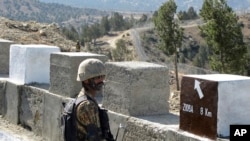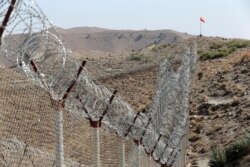Pakistan said Thursday that suspected militants operating out of Afghanistan have attacked several border outposts, killing a paramilitary soldier and “critically” injuring two others.
A Pakistani foreign ministry statement accused Afghan border security forces of facilitating the assailants. “Pakistan strongly condemns this unprovoked, aggressive action by Afghan forces and the evident support provided to the terrorists,” said the statement. It warned that such actions are “detrimental to coordination and cooperation between the two countries.
The Afghan foreign ministry rejected the charges and said that being a victim of terrorism, Afghanistan would not allow any terrorist group to use its territory against Pakistan or other countries. It said that border military officials from both sides held an emergency meeting Thursday at the request of Islamabad to discuss the situation.
The Tehreek-e-Taliban Pakistan (TTP), an outlawed anti-state extremist outfit waging attacks against Pakistani security forces and civilians, took responsibility for Wednesday's attack.
In a statement circulated via TTP social media, the militant group commonly known as the Pakistani Taliban said its fighters used rockets, mortars and other assault weapons to target eight Pakistani border posts.
Pakistani military officials said the overnight militant raid took place in the remote Binshahi border region, which is located opposite to the eastern Afghan province of Kunar.
Islamabad says sustained counterterrorism operations in areas bordering Afghanistan have killed thousands of TTP and other militants in recent years and forced others to flee to the Afghan side.
Pakistani officials also allege that separatist groups operating in the natural resource-rich southwestern border province of Baluchistan have set up bases in Afghan areas.
A United Nations report issued late last month said that a large number of anti-Pakistani government militants, mostly linked to the TTP, are hiding in Afghanistan.
“The total number of Pakistani foreign terrorist fighters in Afghanistan posing a threat to both countries, is estimated at between 6,000 and 6,500, most of them with TTP,” the U.N. report said.
Some of them have joined the Afghan affiliate of Islamic State, known as IS Khorasan Province (ISKP), according to the report prepared by the U.N. analytical and sanctions monitoring team.
The United States has declared TTP as a global terrorist organization for carrying out attacks against American interests, including a 2009 suicide bombing of military base in eastern Afghanistan that killed seven U.S. personnel.
In the past few years, U.S. drone strikes against TTP hideouts in Afghanistan, mostly focusing on Kunar and adjoining provinces, have killed dozens of senior members of the group.
One of the raids in June 2018 eliminated Mullah Fazlullah, the ruthless TTP chief who had ordered attacks on schoolchildren in Pakistan, including Malala Yousafzai, before she won the Nobel Peace Prize.
Pakistan and Afghanistan share a 2,600-kilometer border that until a few years ago had nearly 300 informal crossings in addition to several regular terminals for trade and travelers.
The historic, porous nature of the boundary has for years encouraged illegal movement of drug traffickers, smugglers and militants in both directions. Kabul has long alleged the Afghan Taliban uses Pakistani border areas as hiding and training grounds to sustain insurgent activities in Afghanistan.
Pakistani officials deny the charges and say border security has improved of late because they are unilaterally constructing hundreds of new outposts. They say a strong border fence is also being erected and should be complete by end of 2021.
Islamabad insists, however, a lack of personnel apparently has prevented Afghan forces from fully securing the long frontier on their side, leaving a several-hundred-kilometer stretch unmanned, which encourages militant attacks against Pakistan.





